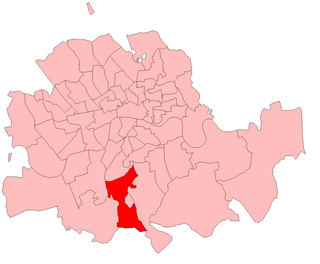
The 1895 United Kingdom general election was held between 13 July and 7 August 1895. It was won by the Conservatives led by Lord Salisbury who formed an alliance with the Liberal Unionist Party and had a large majority over the Liberals, led by Lord Rosebery. The Irish Parliamentary Party was split at this time, the majority of its MPs following John Dillon whilst a rump followed John Redmond.
Frederick Walter Scott Craig was a Scottish psephologist and compiler of the standard reference books covering United Kingdom Parliamentary election results. He originally worked in public relations, compiling election results in his spare time which were published by the Scottish Unionist Party. In the late 1960s he launched his own business as a publisher of reference books, and also compiled various other statistics concerning British politics.

Norwood was a parliamentary constituency in south London which returned one Member of Parliament to the House of Commons of the Parliament of the United Kingdom by the first past the post system.
Middleton and Prestwich was a parliamentary constituency centred on the Middleton and Prestwich districts of Greater Manchester. It returned one Member of Parliament to the House of Commons of the Parliament of the United Kingdom.
The Buckingham by-election of 1943 was a parliamentary by-election held in England on 4 August 1943 for the House of Commons constituency of Buckingham in Buckinghamshire.
The Cheltenham by-election, 1937 was a parliamentary by-election held on 22 June 1937 for the British House of Commons constituency of Cheltenham in Gloucestershire.
The Newcastle upon Tyne North by-election, 1940 was a parliamentary by-election held on 7 June 1940 for the British House of Commons constituency of Newcastle upon Tyne North.
The Portsmouth by-election, 1916 was a parliamentary by-election held for the British House of Commons constituency of Portsmouth on 14 January 1916. The seat had become vacant when Lord Charles Beresford was elevated to peerage as Baron Beresford.
The Liverpool Abercromby by-election, 1917 was a parliamentary by-election held on 28 June 1917 for the British House of Commons constituency of Liverpool Abercromby. The seat had become vacant when the Conservative Member of Parliament (MP) Richard Chaloner had taken the post of Steward of the Chiltern Hundreds on 18 June 1917, thus effectively resigning from the Commons. Five days later, Chaloner was created Baron Gisborough. He had been MP from Liverpool Abercromby since the January 1910 general election. The Conservative candidate, Lord Stanley held the seat for the party. He remained the constituency's MP until the seat was abolished for the 1918 general election.
The Chelmsford by-election, 1892 was a parliamentary by-election held for the British House of Commons constituency of Chelmsford in Essex on 30 April 1892. The seat had become vacant on the death of the Conservative Member of Parliament William Beadel, who had held the seat since its creation for the 1885 general election.
The Wilton by-election, 1900 was a parliamentary by-election held for the British House of Commons constituency of Wilton in Wiltshire on 17 July 1900. The seat had become vacant when the Conservative Member of Parliament Viscount Folkestone had succeeded to the peerage as Earl of Radnor. He had held the seat since the 1892 general election.
The Wilton by-election, 1918 was a parliamentary by-election held for the British House of Commons constituency of Wilton in Wiltshire on 6 November 1918. The seat had become vacant when the Conservative Member of Parliament Sir Charles Bathurst had been elevated to the peerage as Viscount Bledisloe. He had held the seat since the January 1910 general election.
The Thirsk and Malton by-election, 1915 was a parliamentary by-election held on 12 February 1915 for the British House of Commons constituency of Thirsk and Malton in the North Riding of Yorkshire.
The Stalybridge by-election was a Parliamentary by-election. It returned one Member of Parliament to the House of Commons of the United Kingdom, elected by the first past the post voting system.
The Horncastle by-election was a UK parliamentary by-election held on 16 February 1911 in the constituency of Horncastle in Lincolnshire. It was triggered upon the succession to the peerage of the sitting Member of Parliament, Gilbert Heathcote-Drummond-Willoughby, and was won by Archibald Weigall of the Conservative Party.
The Manchester South by-election was a Parliamentary by-election. It returned one Member of Parliament to the House of Commons of the Parliament of the United Kingdom, elected by the first past the post voting system.
The Liverpool Kirkdale by-election, 1915 was a parliamentary by-election held in England on 15 February 1915 for the House of Commons constituency of Liverpool Kirkdale.
The Liverpool East Toxteth by-election, 1916 was a parliamentary by-election held in England on 21 February 1916 for the House of Commons constituency of Liverpool East Toxteth.
The Edinburgh South by-election, 1917 was a parliamentary by-election held for the House of Commons constituency of Edinburgh South in Scotland on 12 May 1917.




